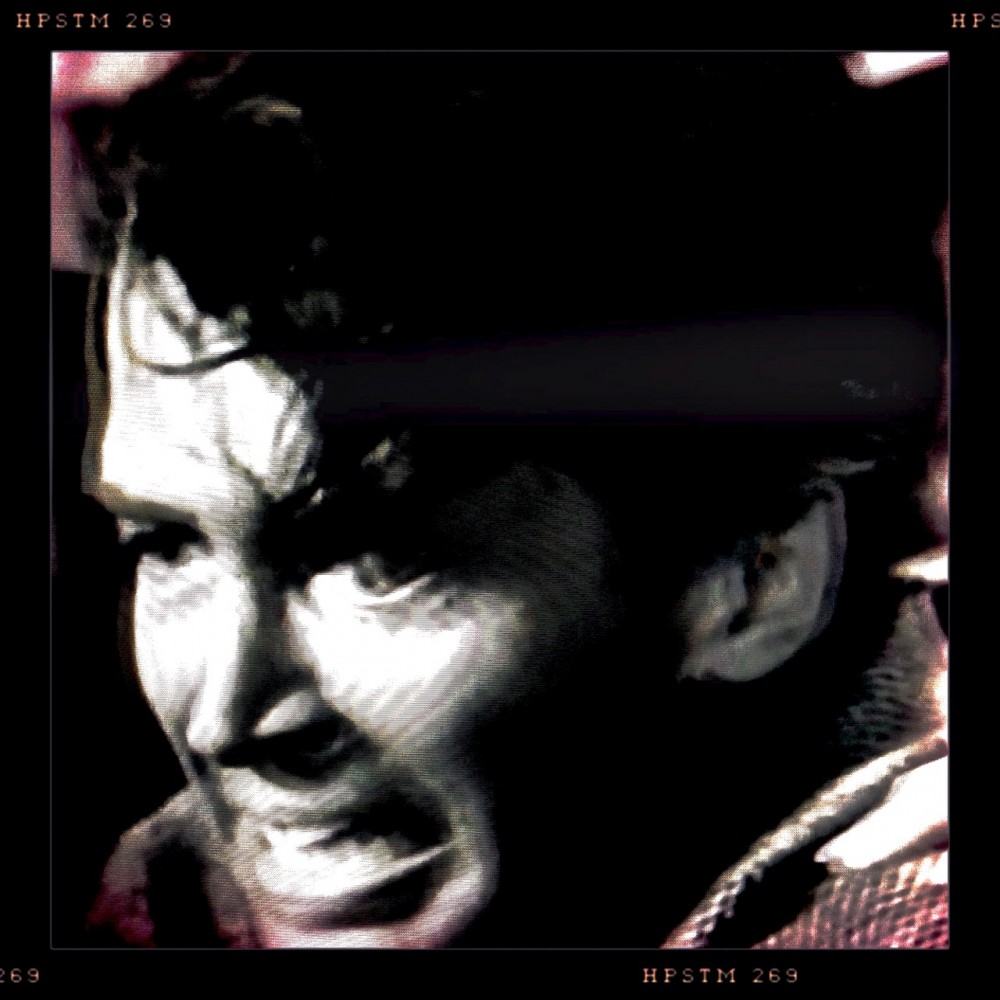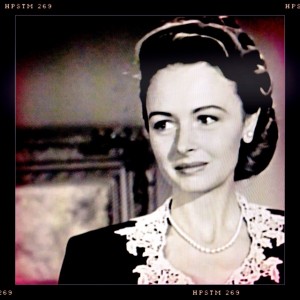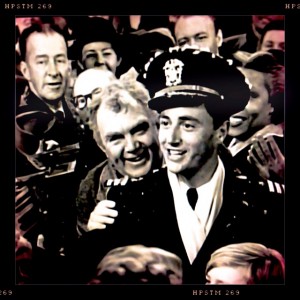
01 Jan Is It A Wonderful Life?
A lot of people have cherished rituals that, whether handed down through generations or of more recent provenance, are central to their observation and enjoyment of the holiday season. I’m not much of a holiday person—I’m typically somewhat more of a bemused observer than an actual participant—but one holiday season ritual of which I have become quite fond is watching ‘It’s A Wonderful Life’ on NBC on Christmas Eve.
‘It’s A Wonderful Life’ emerged as a Christmas season television staple in the late 1970s but it was a money-loser in 1947, producing a deficit of just over a half-million dollars for RKO Pictures upon its initial release. The film’s budget was $3.18 million and included the expense of building a three-block-long main street set on RKO’s movie ranch in Encino. (You can detect the cinematographer, Joseph Walker, attempting to maintain a low camera angle in the scene where George and Mary Bailey move the Martini family from their old house to their new Bailey Park home: The dusty summer hills of southern California lurk incongruously in the background.) After everyone had a chance to mull over its charms for a few decades ‘It’s A Wonderful Life’ became a Christmas institution in much the same way that ‘The Ten Commandments’ was enshrined as an Easter weekend stalwart on ABC (read my take on this bloated behemoth of a blockbuster in the May 2 posting on this site).
In contrast to my quasi-ironic affection for ‘The Ten Commandments,’ I genuinely believe ‘It’s A Wonderful Life’ to be an exceptional film. It is beautifully shot and edited, the screenplay is top notch, and the quality of the acting is exceptional. This is particularly true of the performance of the movie’s star, Jimmy Stewart. From the moment that he first appears as the adult George Bailey, attempting to buy a suitcase for his much-anticipated escape from Bedford Falls, he is rarely absent from the screen. Stewart’s amiable everyman demeanor and his loose-limbed beanpole build (standing 6’3’’, he weighed less than 140 lbs when he was drafted into the Army in 1940) are instantly appealing. It’s pretty much impossible to conceive of anyone else inhabiting the role of George Bailey although Peter Fonda was reportedly also considered for the part (I firmly believe that would not have worked).
The thing that really intrigues me about ‘It’s A Wonderful Life’ is how incredibly dark it is. The prevailing notion of the movie as a sentimental cornball concoction largely discounts the wrenchingly bleak dark night of the soul that George Bailey has to claw his way through in order to achieve redemption. It all comes to a head on Christmas Eve, but George’s date with destiny is a long time coming. Yearning desperately to ‘shake the dust of this crummy little town’ off his feet, George’s ambitions are thwarted time and time again. With his father’s sudden passing he becomes chained to the family’s struggling building and loan business. Consigned to the sidelines during World War II because of the bum ear he incurred as a boy saving his younger brother Harry from drowning, George is a spectator to young Harry’s wartime heroics in addition to his former classmate Sam Wainright’s spectacular success in business. Like his late father, George is perpetually bullied and belittled by the town’s vile and unscrupulous financial tyrant and slumlord, Henry Potter. Every time George thinks he’s getting a foot out the door of his crummy little hometown fate conspires to pull him back in. George accepts his imposed self-sacrifice with stoic resignation.
On the romantic side of things, George’s life is also rather fraught. Since boyhood he has attracted the attentions of both Violet Bick and Mary Hatch. Although he seems largely oblivious of love and sex, George’s head sporadically gets turned by the saucy Violet, but, quite frankly, she’s a bit of a tramp. Meanwhile, sweet and patient Mary blossoms into the luminous Donna Reed. When George realizes that he has finally run out of strategies to avoid accepting that Mary is his true love he reacts with denial and anger. Everybody in town knows they’re meant for one another and even though George knows it too it’s but one more concession to never getting away from Bedford Falls. He rails bitterly against marriage and stability as he and Mary collapse tearfully into each others arms.
All of the conflicts, compromises and lurking tensions in George’s life converge on the evening before Jesus’s birthday. His scatter-brained Uncle Billy—animal lover and Bailey Bros. Building and Loan co-director—accidentally leaves an $8,000 bank deposit wrapped inside a newspaper announcing Harry Bailey’s impending triumphal return to Bedford Falls. Unwittingly, he hands the newspaper to Old Man Potter (played with preening malice by Lionel Barrymore) who watches the subsequent mayhem unfold in the bank lobby from behind his office door.
When George learns of the missing $8,000 he becomes unhinged. A bank examiner is lurking around the Bailey Bros. office waiting to see the account books as George and Uncle Billy desperately try to trace the missing money. When it becomes clear that the money won’t be found George practically throttles Uncle Billy, screaming at him “You know what this means?? It means BANKRUPTCY, SCANDAL AND PRISON!! THAT’S what it means!!” Delirious with rage and fear, George goes home to Mary and his four young children and terrifies them with a barrage of verbal abuse. He smashes a model of a bridge that he had been working on—an artifact of his stillborn architectural ambitions—as Mary and the children cower, bewildered by the incomprehensible violence that has overtaken George. It’s a truly wrenching scene—difficult to bear even after repeated viewings.
Horrified by his own behavior, George flees the house and holes up in Martini’s bar. Much to the consternation of Mr. Martini and Nick the bartender (the great Sheldon Leonard), George gets sloshed and eventually socked in the mouth by the enraged husband of his daughter Zuzu’s school teacher, whom George had harangued on the telephone earlier in the evening. The depth of George’s suffering and bewilderment is very convincingly portrayed by Stewart. Despite his ‘everyman’ appeal, Stewart was extremely adept at tapping into inner reserves of torment and angst—an ability that was later exploited to great effect by Alfred Hitchcock in classics such as ‘Rear Window’ and, especially, ‘Vertigo.’
After tempting fate a bit more with a drunken driving spree, George arrives simultaneously at the end of his rope and the edge of a bridge. This is the moment when his guardian angel Clarence (Henry Travers) appears on the scene, contriving to save George’s life by taking advantage of the only impulse that trumps his self-destructive momentum—his impulse to help others. Clarence provides sporadic comic relief through the next act of the movie, but the darkness around George continues to grow. With the aid of divine intervention, Bedford Falls is shown as a very different place without benefit of the sacrifices of its resident saint: Martini’s Bar (now Nick’s Place) is populated with floozies, goons and thugs; George’s mother is a mistrustful old shrew running a flop house; Violet’s immodest impulses have gotten the better of her and now she’s just a flat-out ho; Ernie the cab driver is a washed-up cynic. Main Street is now a center of hopping nightlife, populated with neon-lit jazz clubs, dance halls and pawn shops. (Despite the film’s best intentions, the new no-George downtown Bedford Falls looks kind of like, well… fun.) Worst of all, Mary is now a pale, drawn Old Maid. And a librarian to boot! Terrified by George’s insistence that she’s his wife (and all the attendant implications), she screams and runs from him. Without George’s moderating influence Violet’s sexuality goes rogue and Mary’s never gets turned loose. Bert the cop lives up to contemporary standards of trigger-happiness by blasting away at the unarmed and retreating George.
Quite frankly, from the moment that Uncle Billy hands the $8,000 to Potter, the movie descends into an exceptionally vivid and affective nightmare. George’s tribulations are of a psychological and deeply disturbing nature: His sacrifices, kind deeds and good nature have all amounted to nothing and his entire world is suddenly and inexplicably turned upside down—everything is familiar yet totally alien. The faces are the same but the people behind them are hostile and suspicious. The entire mid portion of ‘It’s A Wonderful Life’ is a sort of horror film.
Critics have weighed in on this topic over the years, peeling back the movie’s warm, fuzzy veneer to examine the darkness that lies underneath. In 2008, Wendell Jamieson, writing in The New York Times, described ‘It’s A Wonderful Life’ as “a terrifying, asphyxiating story about growing up and relinquishing your dreams, of seeing your father driven to the grave before his time… a story of being trapped, of compromising, of watching others move ahead and away, of becoming so filled with rage that you verbally abuse your children, their teacher and your oppressively perfect wife.” I would tend to be a bit more generous than that regarding Mary: Up until the moment that George goes berserk he is more or less Mr. Milquetoast incarnate. That might get a bit tedious after a while too.
In 2010 the critic Richard Cohen, writing for Salon.com, characterized the movie as “the most terrifying Hollywood film ever made.” In the no-George, bizarro-Bedford Falls portion of the film he suggests that George is not “seeing the world that would exist had he never been born,” but rather “the world as it does exist, in his time and also in our own.” Well, that’s one way to look at it, but it rather defeats the entire premise. Suspension of disbelief is central to the conceit of the film, from opening credits to ‘The End.’ One could apply a similar logic to ‘The Wizard of Oz,’ but to what end?
Of course, the nightmare of Bedford Falls has a happy ending. George realizes the value of his life —The Greatest Gift, as the title of the original 1939 story by Philip Van Doren Stern indicates—and balance is restored to the universe. Snow begins to fall, George’s lip resumes bleeding, he’s deaf in his left ear again, the familiar faces are welcoming once more and Bert the cop restrains himself from blasting away in the dense crowds on Main Street. The entire populace of Bedford Falls turns out to repay George for his lifelong selflessness and decency and Clarence, Guardian Angel, Second Class, finally earns his wings.
Yes, it is a wonderful life after all, but torment and disaster are but one innocent, distracted fuckup away. There, but for the grace of Your Higher Power Of Choice, go you and I. Count your blessings—daily. This is the lesson of Frank Capra’s holiday gem and it’s a lesson that I look forward to reacquainting myself with every December.


